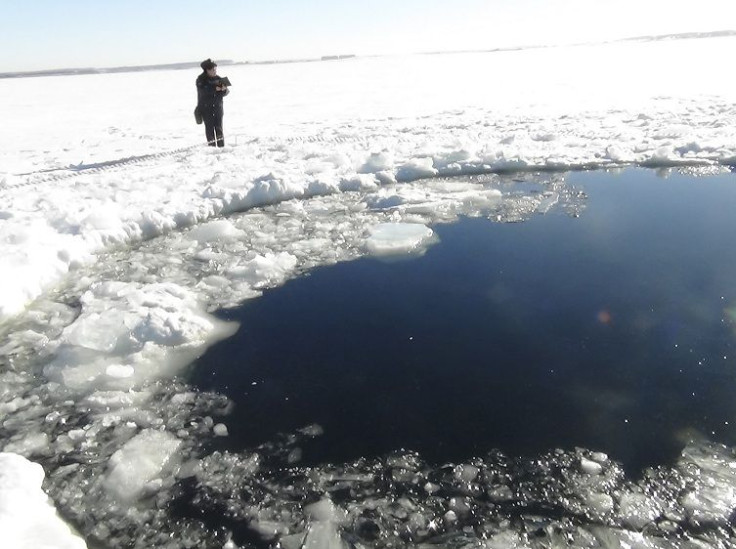Russian Meteor Shower 2013: Scientists Discover Meteor Fragments From Chebarkul Lake
South Florida Residents Report Sighting Meteor Shower

Fragments from a meteor that streaked and exploded over the Ural Mountains in central Russia Friday were discovered by scientists in a frozen lake, Russian media has reported. Apparently, a team from the Russian Academy of Sciences has stated that the fragments are from outer space.
The meteor exploded several kilometers above the earth sending sonic shockwaves and showering debris over a large stretch of region. Over 1,000 people were injured and hundreds of houses and buildings were damaged by shockwaves generated by the explosion.
The debris from the giant rock was estimated to have fallen across a wide area in the Ural Mountains, and reports emerged Friday in local media about its possible plunging into a lake in the region. However, there was no clear evidence recovered to prove the claim.
Meanwhile, thousands of recovery workers and meteor debris hunters descended in the region hunting for the meteor debris after Friday’s explosion that was shot by hundreds of amateur photographers. The divers searched the frozen lake for hours Saturday to locate the fragments of the meteorite.
With people flooding the region, the lake turned into a tourist attraction. RIA Novosti reported Monday that the scientists have made their first discovery of alien fragments in the area suspected to be from the meteor.
On Sunday, an expedition from the Russian Academy of Sciences found certain particles that bore resemblance to rocks found in a giant hole in the ice-frozen Chebarkul Lake in the region. The agency ran tests and confirmed the particles were from outer space, AFP reported quoting news agency RIA Novosti.
"We confirm that the particles of a substance found by our expedition near Lake Chebarkul really do have the composition of a meteorite," the news agency quoted Russian Academy of Sciences member Viktor Grokhovsky as saying late Sunday.
Grokhovsky said the particles were composed of metallic iron as well as chrysolite and sulfite. While another report in the Inquisitr quoting the same official said the rock is made up of “ordinary chondrite.”
The authorities have estimated damage from the meteorite explosion to be to the tune of $33 million, BBC reported.
South Florida Residents Report Sighting Meteor Shower
After the Russian meteorite shower, claims of witnessing meteor shower in a few parts of California seem to be doing the rounds as residents of south Florida reported seeing bright, flare-like objects similar to meteors in the sky, Sunday.
Sun Sentinel quoting the Broward Sheriff's Office and the Coast Guard's command center said several people from Broward and Miami-Dade counties called up to say they saw objects similar to meteors burning and disappearing in the sky.
"Looking over the Biscayne Bay from downtown, I saw an object falling from the sky," Brad Greenberg, 30, of Miami, wrote in a tweet at about 6:30 p.m. "At first, the object was faintly glowing and moving fast but not nearly as fast as a shooting star," Sun Sentinel report said.
The coastguard command center said they did send out a helicopter to probe following the reports of possible meteor sighting but found none.
© Copyright IBTimes 2025. All rights reserved.




















